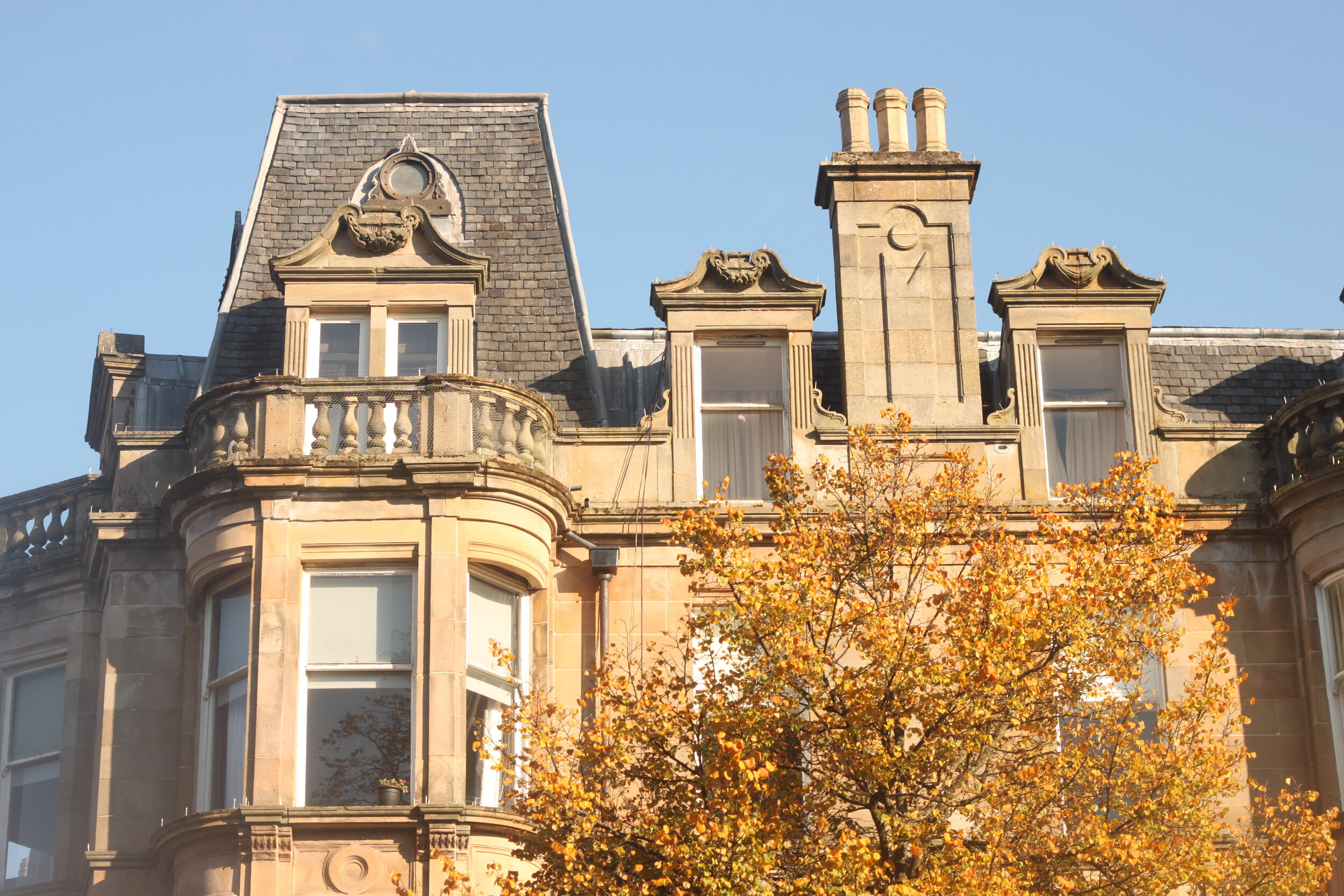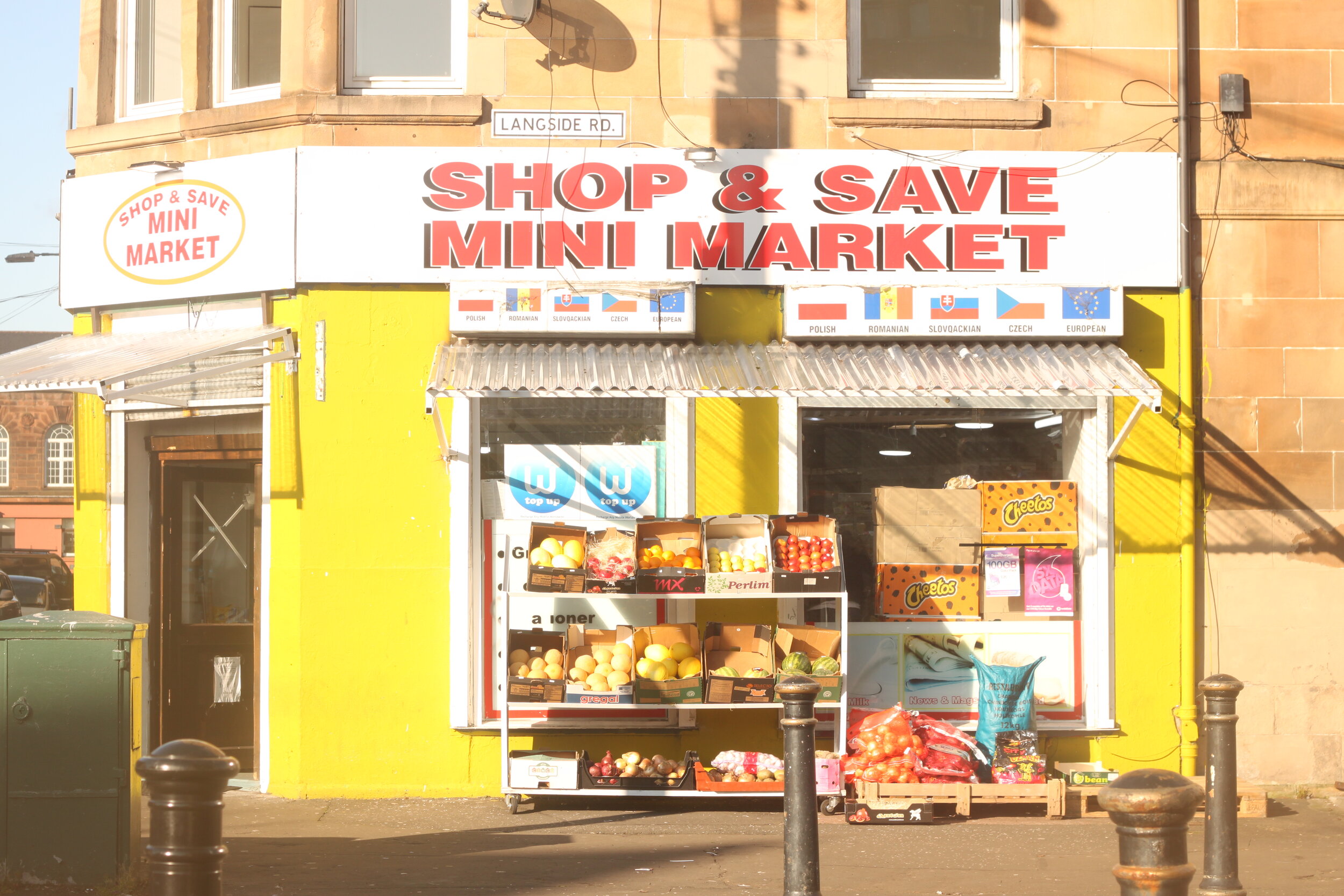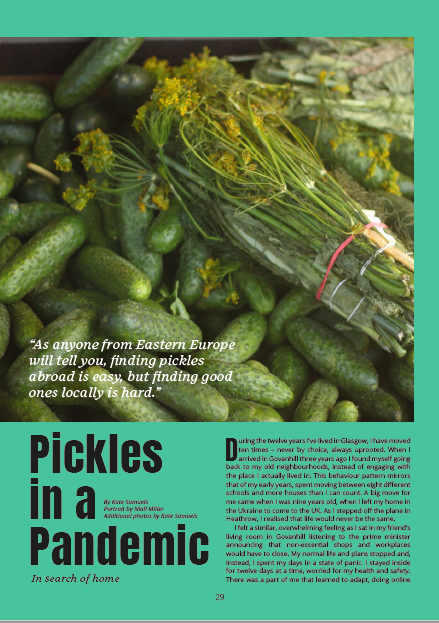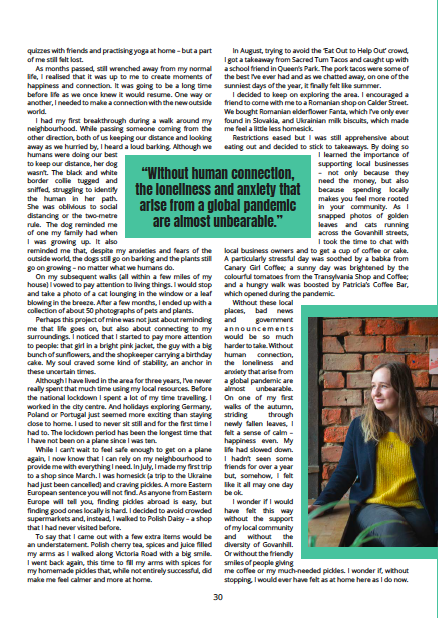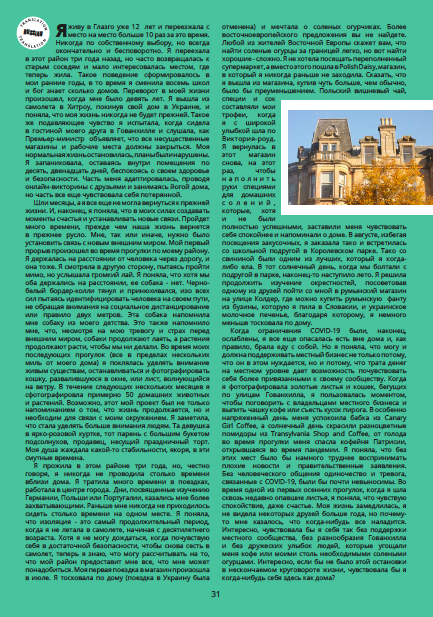Pickles in a Pandemic: in search of home
In Issue 1 of Greater Govanhill, Kate Samuels explored what it meant to be away from her home country during lockdown, and how it enabled her to connect with her local community in a new way.
by Kate Samuels
During the twelve years I’ve lived in Glasgow, I have moved ten times — never by choice, always uprooted. When I arrived in Govanhill three years ago I found myself going back to my old neighbourhoods, instead of engaging with the place I actually lived in. This behaviour pattern mirrors that of my early years, spent moving between eight different schools and more houses than I can count. A big move for me came when I was nine years old, when I left my home in the Ukraine to come to the UK. As I stepped off the plane in Heathrow, I realised that life would never be the same.
I felt a similar, overwhelming feeling as I sat in my friend's living room in Govanhill listening to the prime minister announcing that non-essential shops and workplaces would have to close. My normal life and plans stopped and, instead, I spent my days in a state of panic. I stayed inside for twelve days at a time, worried for my health and safety. There was a part of me that learned to adapt, doing online quizzes with friends and practising yoga at home — but a part of me still felt lost.
It was going to be a long time before life as we once knew it would resume. One way or another, I needed to make a connection with the new outside world.
Kate Samuels | Photo by Niall Miller
As months passed, still wrenched away from my normal life, I realised that it was up to me to create moments of happiness and connection. It was going to be a long time before life as we once knew it would resume. One way or another, I needed to make a connection with the new outside world.
I had my first breakthrough during a walk around my neighbourhood. While passing someone coming from the other direction, both of us keeping our distance and looking away as we hurried by, I heard a loud barking. Although we humans were doing our best to keep our distance, her dog wasn’t. The black and white border collie tugged and sniffed, struggling to identify the human in her path. She was oblivious to social distancing or the two-metre rule. The dog reminded me of one my family had when I was growing up. It also reminded me that, despite my anxieties and fears of the outside world, the dogs still go on barking and the plants still go on growing — no matter what we humans do. On my subsequent walks (all within a few miles of my house) I vowed to pay attention to living things. I would stop and take a photo of a cat lounging in the window or a leaf blowing in the breeze. After a few months, I ended up with a collection of about 50 photographs of pets and plants.
Perhaps this project of mine was not just about reminding me that life goes on but also about connecting to my surroundings. I noticed that I started to pay more attention to people: that girl in a bright pink jacket, the guy with a big bunch of sunflowers, and the shopkeeper carrying a birthday cake. My soul craved some kind of stability, an anchor in these uncertain times.
Although I have lived in the area for three years, I’ve never really spent that much time using my local resources. Before the national lockdown I spent a lot of my time travelling. I worked in the city centre. And holidays exploring Germany, Poland or Portugal just seemed more exciting than staying close to home. I used to never sit still and for the first time I had to. The lockdown period has been the longest time that I have not been on a plane since I was ten.
As anyone from Eastern Europe will tell you, finding pickles abroad is easy, but finding good ones locally is hard.
While I can’t wait to feel safe enough to get on a plane again, I now know that I can rely on my neighbourhood to provide me with everything I need. In July, I made my first trip to a shop since March. I was homesick (a trip to the Ukraine had just been cancelled) and craving pickles. A more Eastern European sentence you will not find. As anyone from Eastern Europe will tell you, finding pickles abroad is easy, but finding good ones locally is hard. I decided to avoid crowded supermarkets and, instead, I walked to Polish Daisy — a shop that I had never visited before. To say that I came out with a few extra items would be an understatement. Polish cherry tea, spices and juice filled my arms as I walked along Victoria Road with a big smile. I went back again, this time to fill my arms with spices for my homemade pickles that, while not entirely successful, did make me feel calmer and more at home.
In August, trying to avoid the ‘Eat Out to Help Out’ crowd, I got a takeaway from Sacred Tum Tacos and caught up with a school friend in Queen’s Park. The pork tacos were some of the best I’ve ever had and as we chatted away, on one of the sunniest days of the year, it finally felt like summer.
I decided to keep on exploring the area. I encouraged a friend to come with me to a Romanian shop on Calder Street. We bought Romanian elderflower Fanta, which I’ve only ever found in Slovakia, and Ukrainian milk biscuits, which made me feel a little less homesick.
Restrictions eased but I was still apprehensive about eating out and decided to stick to takeaways. By doing so I learned the importance of supporting local businesses — not only because they need the money, but also because spending locally makes you feel more rooted in your community. As I snapped photos of golden leaves and cats running across the Govanhill streets, I took the time to chat with local business owners and to get a cup of coffee or cake. A particularly stressful day was soothed by a babka from Canary Girl Coffee; a sunny day was brightened by the colourful tomatoes from the Transylvania Shop and Coffee; and a hungry walk was boosted by Patricia’s Coffee Bar, which opened during the pandemic.
Without human connection, the loneliness and anxiety that arise from a global pandemic are almost unbearable.
Without these local places, bad news and government announcements would be so much harder to take. Without human connection, the loneliness and anxiety that arise from a global pandemic are almost unbearable. On one of my first walks of the autumn, striding through newly fallen leaves, I felt a sense of calm — happiness even. My life had slowed down. I hadn’t seen some friends for over a year but, somehow, I felt like it all may one day be ok.
I wonder if I would have felt this way without the support of my local community and without the diversity of Govanhill. Or without the friendly smiles of people giving me coffee or my much-needed pickles. I wonder if, without stopping, I would ever have felt as at home here as I do now.


